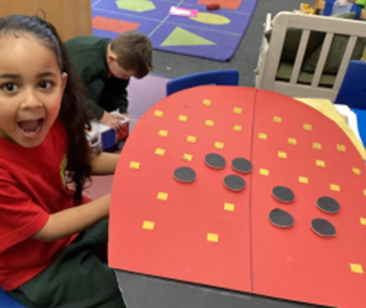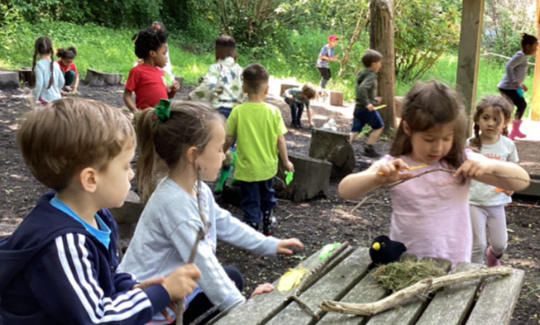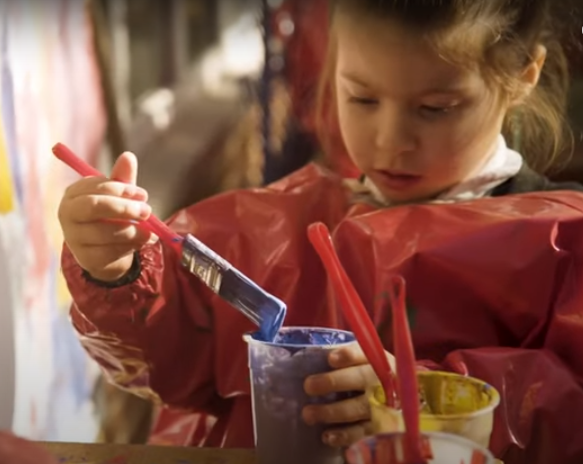EYFS
Jesus said “As I have loved you, so you must love one another. By this everyone will know that you are my disciples.” John 13:34-35
Our school’s vision is rooted in the words and actions of Jesus.
We implement the Early Years Foundation Stage (EYFS) framework alongside the intent to support children in their understanding of faith, hope and service ensuring that every child’s early educational experience is rich and meaningful. Our provision promotes being curious and interactive environments allow children to follow and explore their curiosity first hand. We seek to develop a love of learning which will remain life-long.

Faith: Belief in God, ourselves and each other
We build a foundation of trust and belonging by:
-
Embracing Diversity: We believe that faith in every child's potential is fundamental. Our EYFS environment nurtures this by celebrating diverse cultures, beliefs, and traditions, fostering a sense of belonging and respect.
-
Creating a Secure Environment: Just as faith provides comfort and assurance, we create a nurturing and safe environment where children feel valued and supported. This foundation allows them to be curious, explore, learn, and grow with confidence.
-
Modelling Positive Values: We embed faith-based values in our daily interactions in both curriculum areas and our ethos around relationships and conduct.
Hope: Hope in God's promises for us and for the future
We nurture hope, inspiring a love of learning and resilience by:
-
Encouraging Curiosity: Hope fuels the desire to explore and discover. Our EYFS curriculum is designed to inspire curiosity and a love of learning through child led learning and engaging activities that challenge and stimulate young minds.
-
Fostering Resilience: By encouraging a growth mindset, we help children develop resilience. We support them in navigating challenges, celebrating their efforts, and learning from setbacks, which builds their confidence and optimism for the future.
-
Setting Aspirations: We nurture hope by setting high expectations for every child and support them in reaching their full potential. We want our children to have confidence in their own abilities and to feel that they can achieve whatever they set their mind to.
Service: Serving one another in sefless love
Nursery and Reception begin to explore our whole school Global Neighbours project by understanding that after learning to take care of themselves, they can also help others and explore the ideas of our Christian community in school, the surrounding community and then the wider world. We develop an understanding of community and cultivate a spirit of giving and generosity by:
-
Promoting Teamwork: Our EYFS practices include collaborative activities that teach children the value of working together, sharing, and supporting one another.
-
Encouraging Empathy: We introduce concepts of service through role-playing and community-focused projects, helping children understand and appreciate the importance of helping others and contributing positively to their immediate and wider surroundings.
-
Building Community Connections: We involve families and the wider community in our educational activities, creating a sense of partnership and shared responsibility. This collaboration reinforces the value of service and community spirit in children’s lives.
As with most Early Years Providers, we use the non-statutory document Development Matters, a tool used to support individual children’s learning and development alongside the Early Years Framework. There are three Prime Areas (PSED, Physical Development and Communication and Language) and four Specific Areas (Literacy, Mathematics, Understanding the World and Expressive Arts and Design). In addition, EYFS practitioners look at Characteristics of Effective Learning when making judgements as to the progress children are making.
Our EYFS rationale ensures that we follow our framework alongside our broader educational mission as a Church of England School. We embed our vision and faith-based values into every aspect of early years education. We create a holistic learning environment that nurtures well-rounded, confident, and compassionate individuals. Our commitment to these principles ensures that each child’s journey through EYFS is enriching academically, emotionally and spiritually..

Mathematics
In both Reception and Nursery, the children are given opportunities to explore mathematics both inside and outside the classroom. We have a focus for each week where there are activities based around the learning objective for pupils to engage in. The activities are practical and encourage the children to talk through the mathematics and use resources and manipulatives to demonstrate understanding and address misconceptions. There are adults based at each focus activity to observe pupils in their understanding and extend and challenge them.

Literacy
For Literacy, both Nursery and Reception use a range of resources to mark-make both indoors and outdoors. The focus in Reception is much more on learning to write, whereas in Nursery it is more a case of enjoying making marks and learning key words and sounds through phonics. The aim for Nursery is for all children to be able to write their names by the time they move to Reception. In Reception, with a greater emphasis on learning to write, the children have an opportunity to write on large scale with a range of textures, including whiteboards, with chalk and in sand. The class are able to access a range of books in the book corner and can independently spend time looking at books with their peers or with an adult. Pupils are supported with their reading and writing with daily phonics sessions in both Nursery and Reception. Little Wandle Reading will begin in the Spring Term in Reception.

Understanding the World
In Reception, the children have weekly ICT lessons and develop their ICT skills using the iPads to complete simple programmes. The Nursery children also spend some time in the ICT suite and learning to use iPads. The children explore the outdoors and focus on the changes that can occur over time, with a particular focus on the seasons in Nursery. The children learn about different cultures and religions. We have weekly RE sessions (with the Reception Class following the LDBS curriculum) and we also celebrate a range of festivals from children’s cultural backgrounds, for example Chinese New year.

Physical Development
The children develop their physical development through weekly PE sessions in Reception and regular opportunities in EYFS. The children also develop their co-ordination and their balancing using a range of equipment such as the climbing frame, large wooden blocks, bikes.
The children develop their understanding of safety by learning how to use equipment safely and appropriately.

Expressive Arts and Design
Children are given the opportunity to explore a wide range of media and materials. In Reception, Pupils have access to building materials to construct with a purpose and use tools appropriately.
Pupils develop their imagination taking on different roles in their play. They learn to engage in the same theme as their peers and negotiate and take turns.

Personal, Social and Emotional Development
Through play opportunities, pupils learn to develop empathy and understanding of others needs and how their actions can have an impact on individuals.
Pupils learn to negotiate, share and take turns with their peers. They develop the skill to deal with disagreements using words.
Pupils develop secure friendships and develop the ability to work together with their peers.

Communication and Language
Pupils are given ample opportunity to develop their listening and attention skills through small group and whole class activities. Pupils learn to listen and take into account what the other person is saying through play opportunities. Pupils are encouraged to use talk in their play and learning to develop a wide breadth of vocabulary and have the ability to share their experiences and understanding.
Assessing our Children and Partnership with Parents
At Forty Hill we believe in letting the children learn through play as well as some more structured sessions in order to ensure that language and mathematical concepts are developed, ready for the National Curriculum in Year 1.
In order to assess our children accurately, we use teacher judgement as well as supporting evidence from the Development Matters curriculum. As much of the evidence gathered in EYFS will be through observations of children’s behaviour, and we use a system called Tapestry to record our observations. This is an online tool that stores photographs alongside teacher comments, pupil voice (where appropriate) and a Development Matters milestone. By logging on with a secure username and password you will be able to view all of your child’s observations and photographs. You will even receive an email telling you when a new observation or piece of work is available for you to view. This will enable you to follow your child’s individual progress closely, and you can also add your own comments for us to read.

